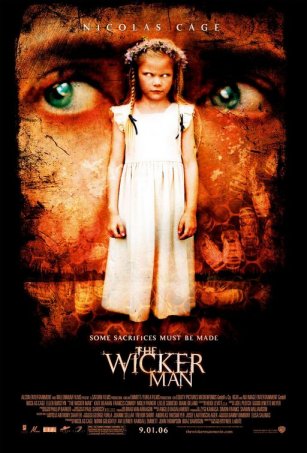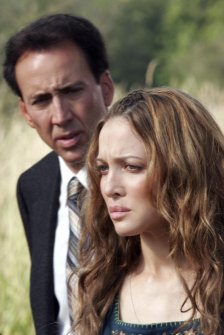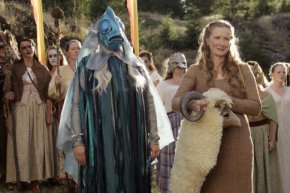|
The
Wicker Man
Picking on a remake of a cherished cult film is, above all
else, a practice in stating the obvious. Yes, the original
is better. No, we didn’t need to see another take
on the concept. It’s a very rare occurrence when a
remake takes left-turns to ultimately arrive at something
that not only complements the original film, but adds to
the themes of the concept as well.
Sadly,
this isn’t the case for Neil LaBute’s remake
of the 1973 film The Wicker Man. Sure, the left-turns
are there, and LaBute appears to be trying to add some contextual
layers to the conceit of the original. Yet ultimately the
writer-director loses something in the process, and his
attempts at being profound and unique end up feeling confused,
muddled, and even unintentionally campy at times.
This
isn’t to say that the original doesn’t have
goofy moments of its own to contend with. The music, one
of my favorite aspects of the original, feels a bit dated
in hindsight.
Where
LaBute’s version goes wrong is not even clear. There
are moments, nay ideas, that feel like they could have been
elaborated upon, but ultimately fall flat and almost feel
degrading in an odd way.
To recap,
the story is pretty similar to that of the original. A police
officer enters a private island commune in search for a
missing girl and becomes overwhelmed by the community’s
neo-pagan rituals. The difference is, this modernized re-imagining
drops the whimsical folksy spirit of the music-charged original
in exchange for the dreary and somber beauty of Vancouver
posing as Washington.
LaBute
has decided that not enough about the protagonist, renamed
Edward Malus (Nicolas Cage), was known in the original.
What motivated him? What drove him to Summerisle in the
first place?
Director
Robin Hardy felt it adequate to begin the film with Edward’s
counterpart Sergeant Howie arriving at Summerisle. Perhaps
Hardy felt it was enough that Howie had been contacted by
someone on the island and was sent to investigate the proposed
missing child. LaBute feels it necessary to begin the film
months prior to Malus’ arrival, establishing a history
of loss and failure in Malus’ past.
The
problem is, LaBute’s script tries to establish meaning
where there is very little to work from. We watch Malus
pull over a station wagon, meet the mother and child in
the vehicle, and then watch as a semi truck plows into them
at full speed. Malus, naturally, is shaken up and takes
a leave of absence only to have his interest piqued when
a letter from his former fiancé Willow Woodward arrives.
The
letter asks him to help her locate her missing child on
Summerisle, and so dutiful Edward hurries off to find this
mysterious island nestled away in Puget Sound. What he finds
is a surprise – not only to Edward but fans of the
original as well.
In the
original, the inhabitants of Summerisle were clearly different,
but the community felt like a free and working society.
The people on the island may have appeared to have something
to hide, but they were never painted as pure evil or even
looked down upon. Their rituals were jarring to the good
Christian sergeant, but although Howie was disturbed by
their actions the camera never looked down upon them.
LaBute’s
Summerisle is an uncomfortable island led by feminine dominance.
In place of celebrations of fertility we are given, well,
not much really. The frank sexuality and respect for fertility’s
role in the community is replaced with domineering women
who seem frigid and angry instead of protective of the island’s
secrets.
At first,
LaBute’s decision to replace the religious/spiritual
dissection with one of gender politics feels inspired, but
once the curtain has been lifted the feeling that LaBute’s
message may be a touch chauvinistic sets in. Even a dynamic
performance by Ellen Burstyn as Sister Summerisle bookends
nicely with Christopher Lee’s enigmatic turn as Lord
Summerisle, but isn’t enough to right the ship in
the end.
The
big scene of debate, as it were, remains intact yet loses
much of the impact – I’ll leave it at that.
The importance of Manus’ fate never rings true completely,
and his outbursts are silly and wooden – reinforcing
the feeling of chauvinism mentioned before. Nicolas Cage
couldn’t hold a candle to Edward Woodward. Ok, that
pun is inexcusable.
In the
closing sequence LaBute retreads, perhaps after realizing
that his message has swung too far. What he proposes, in
the end, is not only fuel for potential sequels, but a glimmer
of what LaBute was trying to establish with his female-centric
Summerisle. Unfortunately, he became too lost in his own
plot along the way leaving most viewers wondering why a
remake was ever necessary in the first place.
Rating:

|








